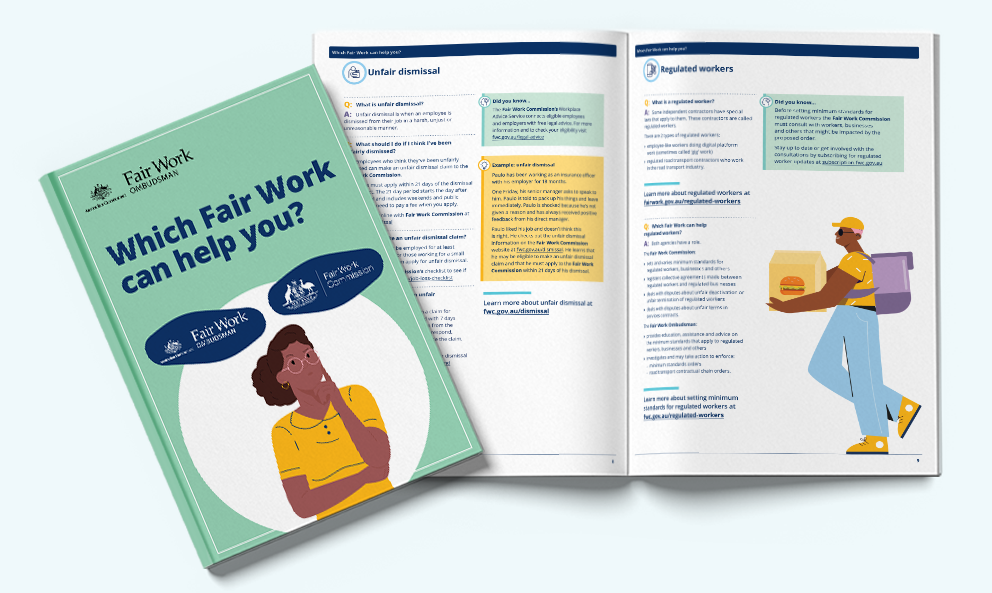Difference between the Fair Work Ombudsman and the Fair Work Commission
 Guide: Which Fair Work can help you
Guide: Which Fair Work can help you
Our guide Which Fair Work can help you Which Fair Work can help you helps you understand the differences between us (the Fair Work Ombudsman) and the Fair Work Commission.
This guide covers common workplace situations and helps you work out which is the right agency to go to for information and assistance depending on your situation.
The Fair Work Ombudsman (us) and the Fair Work Commission (the Commission) are independent and separate government organisations.
Find out the difference between us and the Commission.
On this page:
- The Fair Work Ombudsman
- The Fair Work Commission
- Video: Roles of the Fair Work Ombudsman and the Fair Work Commission
- Tools and resources
- Related information
The Fair Work Ombudsman
The Fair Work Ombudsman is the national workplace relations regulator.
We help employers and employees by providing information, education and advice on pay rates and workplace rights and obligations. We also enforce compliance with the Fair Work Act, related legislation, awards and registered agreements.
What we do
We:
- educate employers and employees about employment conditions, including about:
- minimum entitlements, such as pay, leave, hours of work and breaks
- awards and registered agreements
- starting and ending employment
- workplace protections
- fixing workplace problems
- promote and monitor compliance with workplace laws by:
- investigating breaches of the Fair Work Act and recovering underpayments
- taking appropriate enforcement action, including litigation
- enforcing certain orders made by the Commission
- provide advice to employers and employees about workplace problems, including:
- rights and obligations
- best practice guides and tips
- share information and educate employers and employees about Australia’s workplace relations system, including about:
- changes to workplace laws
- updates to awards
- our priority sectors.
Example: What the Fair Work Ombudsman can help with
Aya needs help finding her minimum pay rate because she thinks she’s being underpaid.
Aya reads our website and decides to call us. We tell Aya the award rate of pay and give her advice about what to do if her pay isn’t right.
What we can't do
We can't:
- deal with unfair dismissals and unlawful terminations
- change legislation, awards or registered agreements
- investigate bullying complaints.
Example: What the Fair Work Ombudsman can't help with
Sione thinks he has been fired for unfair reasons.
He checks our website and finds out we can’t help with unfair dismissal issues.
Sione visits the Commission’s website and makes an application for unfair dismissal.
The Fair Work Commission
The Commission is the independent national workplace relations tribunal.
The Commission also regulates registered organisations.
What the Commission does
The Commission:
- maintains minimum wages and conditions by:
- setting and annually reviewing the National Minimum Wage
- adjusting and creating modern awards
- deciding on equal remuneration claims
- hearing and deciding on major cases
- helps with enterprise agreements by:
- approving, varying and terminating agreements
- ensuring employers and employees bargain in good faith
- deals with issues relating to job loss or dismissal, including:
- unfair dismissal
- unlawful termination
- unfair deactivation and termination
- general protections breaches
- redundancy
- helps with issues about:
- an award or agreement
- right to disconnect
- bullying at work
- workplace sexual harassment
- discrimination and adverse action
- flexible working arrangements
- extending unpaid parental leave
- fixed term contracts
- transfers of business
- stand downs
- casual to permanent status
- unfair contracts for independent contractors
- labour hire arrangement orders
- makes orders and deal with disputes for regulated workers, including:
- minimum standards orders and guidelines
- road transport contractual chain orders and guidelines
- registering collective agreements for registered workers and businesses
- dealing with disputes about unfair deactivation and termination
- make orders about labour hire employees’ protected rates of pay
- makes orders about industrial action, including:
- protected action ballots
- strikes, work bans and lockouts
- regulates registered organisations, such as unions and employer groups, by:
- setting rules about right of entry
- making inquiries and investigations.
What the Commission doesn't do
The Commission doesn’t:
- provide advice on wages, conditions and entitlements under an award or a registered agreement
- enforce minimum pay and award entitlements.
Translated resources
The Commission offers translated information and resources in many languages to help you understand their role and how they can help you.
To find out more about what the Commission does, visit Fair Work Commission – Information in your language.
Video: Roles of the Fair Work Ombudsman and the Fair Work Commission
Watch our short video to find out more about the different roles of the Fair Work agencies.
The above video is also available in several other languages. These include:
Source reference for page: Fair Work Act 2009 sections 576, 682
Tools and resources
- About the Fair Work Ombudsman fact sheet
- Other workplace relations help
- Which Fair Work can help you Which Fair Work can help you